for Ihab Hassan
1
Closing the door is supposed to open some
inward source—as with, for example, the prayer-
closet: the text says go in and “shut thy door.”
It's a stroke of luck when traditional
wisdom so matches the turning of the season.
2
I've ofen thought of writing a poem of grotesque
length (an epic, yes) and setting the entire argument
the instant after Gautama's enlightenment, while
it seemed to him he would pass directly
into Nirvana, while the powers of good trembled
thinking man was lost. It was only an
instant, because of course the Buddha
reconsidered.
3
Bulls for the bull-fight must (this is
absolutely essential) be
innocent. The very brightest are certainly,
by human standards, stupid, but
after a few fights the
dullest among them would learn not to
charge an empty cape but turn and
massacre the fancy-pants who dances there
for a bloody crowd. But, as Hemingway
noted, the bull never survives. I can't, myself, get
excited about “life and death, i.e., violent
death,” and have never been able to
the brute who runs with his
head down or for the show-off, who
has it coming. I'll probably never
develop a taste for battle or
get seven novels written or kill myself.
4
History is hard for me. I’ve no
sense for it.
5
The world—and if ever there was a self-evident
proposition, here it is—the world
is a big fish. I've caught it in
my net. And now, long into the winter
nights, wearily, I study my net.
The fish stinks.
6
A friend talks passionately in favor of
silence. I listen to him. He says, “Silence
dissolves the categories” and “Silence renews
the potential of consciousness.” And it strikes me
that I should say something.
But I've never been able to argue. And whenever there’s
been a choice between speaking and keeping still,
I’ve kept my mouth shut. Well,
usually. And only after
a certain amount of prodding I’ve
produced the necessary conventional sounds,
feeling the thread of words I spew
inordinately fragile, certainly nothing
to depend on. Whereas the craw of
silence is vast and, anyway,
already has us—it’s the scorching sunlight
of a Nilescape or the wind across the Great
Plains, burying us. Friend, waist deep in dust or
sand, maybe we’d contrive a gesture.
7
I passed the peak of my
energy at the age of—it's
hard to believe—
twelve. Since then,
little by little, I've collected
the furniture of my house.
I teach meanwhile, and I
study, but no one knows
my specialty.
8 XMAS [after Pessoa]
A god is born. Some other Gods die. Truth
has neither come nor gone, only the Error has changed.
We have now another Eternity,
and the world is no better off than it was.
Blind Knowing plows a sterile plain
Lunatic Faith lives a dream of worship.
A new God is nothing but a word.
Seek not. Nor believe. All is occult.
9
time is molecular—so much for
Zeno—and each moment brings everything
out of nothing. In the beginning (each
beginning) the universe is only a
point—no dimension—and then
it’s a world, for a moment, and
each moment is apocalypse. Continuous
creation it used to be called, and now
we say expanding universe because (I
forgot to say) each moment is more. Whatever else it may
be, it's always more. No wonder the poet cries
“Oh,Oh,”
or, on a higher level, lyrical verses. But don’t
worry. I’m not violent. We all
live in a residue of
bright pulsations, a gob
of time, an after-image.
10
How naive can you get?—I
was wondering, when the Great
Year comes around to this point again
and the next me sits signing his
poems Keith Waldrop, will he
remember back across the void
of Decembers to where I drift into these
speculations? And a moment’s
thought answers my stupid question: I
remember nothing.
11
When I think of the books you could
fill with what I don’t know, oof. The pressing need’s
for a phenomenology of ignorance. Everything has
horizons, and they’re not just
out of sight, they loom. Yes, and they beckon.
An open door is plain and simple, like a
wall. A closed door is an invitation. But if
the knob is turning . . . ?
Well, I’m closing in, or opening up. I’ve been so
bloody finicky the mysteries catch me sometimes
with my lids down. But I’m preparing. I need
many voices for my revenge.
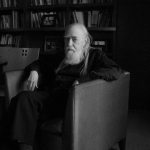
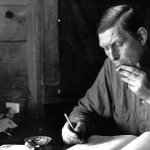








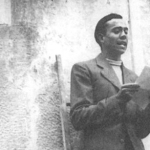






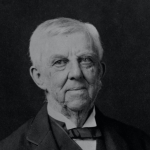
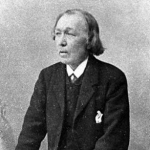

Comment form: